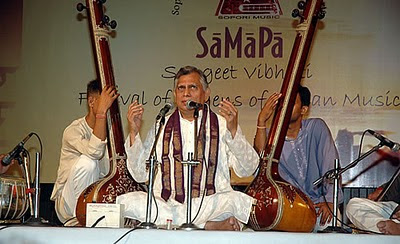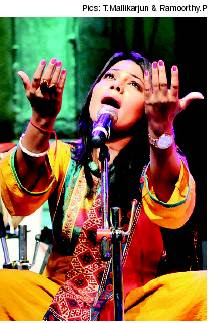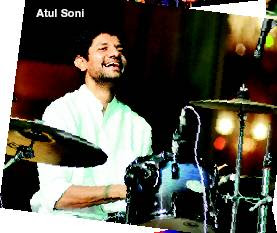
Aditya Kalyanpur (born 21st July 1978) is an Indian Tabla player. He belongs to the Punjab gharana.
Early life and background
Aditya Kalyanpur was born in Mumbai, India.
He began his studies at the age of five under the guidance of Tabla Maestro late Alla Rakha Khan and his son Zakir Hussain.
He is a commerce graduate.
Performing career
Aditya Kalyanpur was initially known for his debut performance with his guru Zakir Hussain for the Wah Taj! commercial when he was 11 years old.
His style consists of bold and clear execution of syllables, pinpoint precision in rhythm coupled with a colossal repertoire of compositions and improvisational technique.[citation needed]
He has accompanied artists including Shivkumar Sharma, Amjad Ali Khan, Prabha Atre, N. Rajam, Sultan Khan, Shahid Parvez, Vishwa Mohan Bhatt, Satish Vyas, Shujaat Khan, and Nayan Ghosh. He has also accompanied Carnatic performers including T. N. Krishnan, N. Ramani, U. Shrinivas, and Lalgudi Krishnan. Currently on tour with AR Rahman for his JAI HO World Tour![citation needed]
Awards
* “A” Grade Artist of All India Radio
* ‘Taal – Mani’ by Sur Singar Samiti
* Vidyasagar Award, ITC
* Sangeet Visharad
* National Scholarship for Advanced Training, Government of India
* Awardee of Pandit Jasraj Competition, Vedic Heritage Center, Long Island, New York
Performances
* Orient Arts Festival, Estonia
* Edinburgh festival, Scotland (2003)
* Earagal Arts Festival, Ireland
* Jazz Yatra, Mumbai
* Great Lakes Folk Festival, Lansing, Michigan
* Saptak Festival
More About Aditya Kalyanpur.
Having age by his side, young tabla percussionist Aditya Kalyanpur has turned miles into milestones.
The Tabla, one of the most versatile of world percussion instruments, is a very important accompanying instrument in the world of Indian classical music. It is absolutely essential for the main artist and the accompanying Tabla player in any performance situation to vibe well on stage in order to reach the audience at large.
Beginning his studies at the age of five under the vigilance of Tabla Maestro late Ustad Allarakha and tabla Maestro Ustad Zakir Hussain, Aditya is considered as one of the most promising torchbearers of the Punjab Gharana style of tabla performance.
Aditya was first seen with his Guru Ustad Zakir Hussain for the famous “Wah Taj!” television commercial at the age of 11. Having the honor of being recognized as an “A” Grade Artist of All India Radio, he has given public performances along with his Guru. Since then he has lent the enchanting music of his tabla to numerous commercials. We hear his Tabla ringing in the background of the film “Everybody Says I am Fine” where Zakir Hussain composed the background score.
To quote the acknowledging words of Tabla maestro Ustad Zakir Hussain for his young, talented disciple; “Even a young player like, say, Aditya Kalyanpur has the ability to approach the instrument with much more expertise than someone of his age would do 30 years ago.”
As a young man, Aditya has lived up to the words and reputation of his teachers, mastering the intricacies of the tabla to smoothly accommodate himself to the requirements of the main artist. His style consists of bold and clear execution of syllables, pinpoint precision in rhythm coupled with a colossal repertoire of compositions and improvisational techniques, making his concerts a sheer joy.
As a young Tabla player, Aditya has had the honor of accompanying great maestros of Indian classical music such as Pandit Shivkumar Sharma, Ustad Amjad Ali Khan, Dr. Prabha Atre, Dr. Mrs N Rajam, Ustad Shamim Ahmed Khan, Ustad Sultan Khan, Ustad Shahid Parvez, Pandit VishwaMohan Bhat, Pandit Satish Vyas, Ustad Shujaat Khan, Pandit Nayan Ghosh as well as Kathak dancers such as Shama Bhate, Sunaiyana Hazarilal, Late Madhurita Sarang, and many others as time has passed, such as Carnatic music legends Vidwan TN Krishnan, N. Ramani, U. Srinivas and Lalgudi Krishnan.
Honored with the title of ‘Taal – Mani’, Aditya Kalyanpur is the recipient of I.T.C’s prestigious “Vidyasagar Award” as well as the “Sangeet Visharad.” A commerce graduate, Aditya Kalyanpur pursued and has also achieved distinction grades as a Music Diplomate from Mumbai University. He has received scholarship from the Centre for Cultural Resources and Training, New Delhi. A recipient of the National Scholarship for Advanced Training instituted by the Government of India, Aditya has also won the prestigious Pandit Jasraj Competition held at the Vedic Heritage Center, Long Island, New York.
In addition to many awards given in India and the United States, Aditya is one of the first tabla players ever to be invited to Estonia for the prestigious Orient Arts Festival. As a soloist and accompanist, Aditya has performed at other prestigious music festivals in India and abroad including the Edinburgh festival in Scotland (2003), the Earagal Arts Festival in Ireland, and the Jazz Yatra (Bombay).On a more local scene, Aditya has also appeared at the Great Lakes Folk Festival held every year in Lansing, Michigan, and many other such festivals and competitions held across the United States.
As a mark of his true versatility and the regard which many different groups in many different genres have for Aditya as a performer, he has performed solo for many bands and instrumental groups, to include the world famous rock and roll group the Rolling Stones and also recorded for their saxophonist, Tim Ries.
Aditya is currently a band leader of his fusion band ‘Fuzikk’, and a member of the world renowned group ‘Bombay Jazz’ comprised of Jazz legends Larry Coryell, George Brooks and Indian Flute Maestro Pandit Ronu Mazumdar. Aditya has made several guest appearances with many other groups over time, including the Boston-based world renowned Jazz group ‘Natraj’.
Wanting to give back as one who has been offered so much, Aditya has been part of several fund-raising and charity events for Asha Foundation’s Notes of Hope with Santoor Legend Padmavibhushan Pandit Shivkumar Sharma and Amma Foundation’s fund-raising events with Rahul Sharma for the 2005 Boxing Day Tsunami victims.
Based in Mumbai, India carving a niche for himself on the United States and international circuits. His schedule finds him giving numerous solo performances, and accompanying artists in overseas and stateside venues such as MIT, Harvard, Cornell, and Yale just to name a few. He also has the honor of being a Tabla Faculty Member at the prestigious Harvard University’s Sangeet Music School and Raganjali School of Music, Boston.
Aditya Kalyanpur can be reached via email at aditya@adityatabla.com Please allow time for him to respond to queries and emails, as his schedule requires long hours and traveling.
Aditya Kalyanpur goes beyond bordersAditya Kalyanpur























